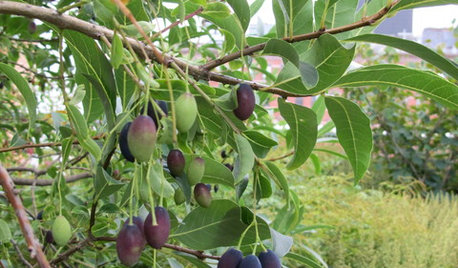'The Invisable Plant'
The_Mohave__Kid
19 years ago
Related Stories

FURNITURE9 Ways With the Invisible Coffee Table
Contemporary acrylic table adds clutter-free function for every design style
Full Story
GARDENING GUIDESGreat Design Plant: Chionanthus Virginicus
Lacy flowers cover native white fringetree in spring, and birds feed off its berries in winter
Full Story
GARDENING GUIDESGot a Hot, Humid Landscape? Add Tropical Flair With Air Plants
Turn tree trunks and walls into lush canvases with plants adapted to the canopies of the rainforest
Full Story
CONTAINER GARDENSSolve Your Garden Border Dilemmas With Planted Pots
Set your containers free from the patio — placed among plantings in the ground, they fill unsightly gaps, let you experiment and more
Full Story
SHRUBSGreat Design Plant: Baja Fairy Duster, a Scarlet Stunner
Bright red puffball flowers are the main attraction here; consider the minimal care a bonus
Full Story
GARDENING GUIDESGreat Design Plant: Lonicera Sempervirens
Grow this long-blooming, flashy flowering vine to cover a fence or arbor and attract hordes of hummingbirds all season long
Full Story
GARDENING GUIDESGot Frost-Damaged Plants? How It Happens, and When and How to Prune
Crispy brown leaves are a sure sign that Jack Frost has been to your neighborhood
Full Story
GARDENING GUIDESDecorate the Landscape With Versatile Agave
Beautiful, succulent leaves reach toward the sky, adding texture and beauty to the drought-tolerant landscape
Full Story
EARTH DAY‘Terroir’ Brings a Sense of Place to Your Landscape
Species native to and characteristic of your region firmly root your garden and landscape
Full Story
URBAN GARDENSUnwind in an Enclosed Garden Sanctuary — Outdoors or In
Refresh your spirits amid the beauty of a walled garden or an interior courtyard designed with thoughtful plantings
Full Story






quercus01
froggy
Related Professionals
Bowie Landscape Contractors · Concord Landscape Contractors · Downey Landscape Contractors · Fort Mill Landscape Contractors · Long Branch Landscape Contractors · North Plainfield Landscape Contractors · Pahrump Landscape Contractors · Pleasant Grove Landscape Contractors · Tuscaloosa Landscape Contractors · Canoga Park Fence Contractors · Lexington Fence Contractors · Libertyville Fence Contractors · Norwalk Fence Contractors · Oak Creek Fence Contractors · Plainfield Fence ContractorsMillet
mobird
ken_mce
The_Mohave__KidOriginal Author
quercus01
BradleyQT
garden_witch
garyfla_gw
BradleyQT
bigeasyjock
The_Mohave__KidOriginal Author
quercus01
garyfla_gw
garden_witch
garyfla_gw
catalina_101